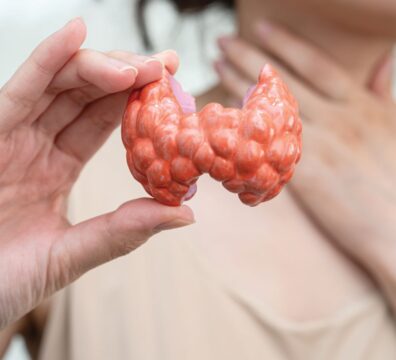When you’re hoping to get pregnant, you probably pay close attention to your cycle, your nutrition, and your overall lifestyle. But there’s one tiny organ that’s often overlooked – and yet it plays a huge role in fertility: your thyroid. Especially if you’ve been diagnosed with Hashimoto’s thyroiditis, it’s important to understand how closely your thyroid health is linked to your ability to conceive.
What does the thyroid actually do?
The thyroid gland – shaped like a butterfly and located at the base of your neck – produces the hormones T3 and T4. These regulate metabolism, energy levels, temperature, mood, and even your menstrual cycle. A well-functioning thyroid is essential for healthy egg development, ovulation, and a stable pregnancy.
What is Hashimoto’s?
Hashimoto’s thyroiditis is an autoimmune condition in which the immune system mistakenly attacks the thyroid gland. This leads to chronic inflammation and the gradual destruction of thyroid tissue, often resulting in an underactive thyroid (hypothyroidism). Common symptoms include tiredness, weight gain, feeling cold, irregular periods, mood swings and low mood – though the condition can go unnoticed for years.
How common is Hashimoto’s – and how is it diagnosed?
Hashimoto’s is up to 10 times more common in women than men and affects around one in six women with a genetic predisposition. Diagnosis is made through blood tests (TSH, free T3, free T4 and TPO antibodies) and an ultrasound of the thyroid.
Trying to conceive with Hashimoto’s – what to look out for
Even with normal thyroid hormone levels (a so-called euthyroid state), the presence of TPO antibodies can negatively impact fertility. Research shows:
- Reduced egg quality
- Lower embryo development potential
- Increased risk of miscarriage
- More difficulty getting pregnant
That’s why, if you’re trying to conceive, many doctors recommend aiming for a TSH level below 2.5 mIU/l.
4 Steps to support healthy conception and pregnancy with Hashimoto’s
The good news? With the right support and treatment, Hashimoto’s doesn’t have to stand in the way of your dream of having a baby.
-
Get the right dose of levothyroxine
The cornerstone of treatment is usually daily L-thyroxine to replace missing thyroid hormones. It’s important to check your levels regularly – especially when you’re planning to conceive or already pregnant.
-
Support your body with key nutrients
Research has shown that certain micronutrients may help calm the autoimmune response and support thyroid health:
- Selenium – helps thyroid function and may improve wellbeing
- Vitamin D – essential for immune balance
- Iron – required for thyroid hormone production
- Magnesium & B vitamins – support metabolism and hormonal balance
- Iodine – only under medical advice, as too much can worsen autoimmunity
-
Choose an anti-inflammatory diet
A Mediterranean-style diet – rich in vegetables, healthy fats and fish – is a great choice. Unless you’ve been diagnosed with coeliac disease, a gluten-free diet is not generally necessary, although some women do report benefits.
-
Lower your stress levels
Chronic stress can trigger or worsen autoimmune responses. Make rest, sleep and stress-reducing routines part of your care plan.
In summary
The thyroid may be small – but it has a big impact on your fertility. If you’ve been diagnosed with Hashimoto’s (or suspect you may have it), it’s worth taking a closer look at your thyroid values and supporting your body in a holistic way. With good medical care and a healthy lifestyle, your chances of a healthy pregnancy can improve significantly.
💡 Make sure to get your levels checked regularly – especially TSH, fT3, fT4, TPO antibodies, vitamin D, selenium, and iron. And talk to your GP or fertility specialist early on about your plans to conceive.
Nutritional support tailored to your needs
Fertilovit® F Thy was specifically developed for women with Hashimoto’s and fertility goals. It contains a carefully balanced combination of selenium, vitamin D, folic acid, iron and other nutrients that gently support thyroid function, immune balance and reproductive health.
👉 Learn more: fertilovit.com/f-thy
FAQ: Hashimoto’s and Fertility
Can Hashimoto’s affect fertility?
Yes. Even when thyroid hormone levels are within the normal range, TPO antibodies can negatively influence egg quality, embryo development and implantation. Studies also show an increased risk of miscarriage.
What is the optimal TSH level when trying to conceive?
Many specialists recommend aiming for a TSH level below 2.5 mIU/l when planning for pregnancy. Regular monitoring is essential – especially before and during pregnancy.
Which nutrients support the thyroid in Hashimoto’s?
Key nutrients include selenium, vitamin D, iron, magnesium, and B vitamins. These micronutrients help support thyroid function, immune balance and hormonal regulation. Excess iodine has been found to exacerbate the situation.
What diet is recommended for Hashimoto’s and conception?
An anti-inflammatory, Mediterranean-style diet – rich in vegetables, healthy fats yet not too much fish (because of its iodine content) – is ideal for supporting metabolism and immune health. A gluten-free diet is only necessary if coeliac disease is diagnosed, though some women may notice benefits.
Can you get pregnant with Hashimoto’s?
Yes. With the right medical treatment, a healthy lifestyle and targeted nutritional support, many women with Hashimoto’s successfully achieve healthy pregnancies.

